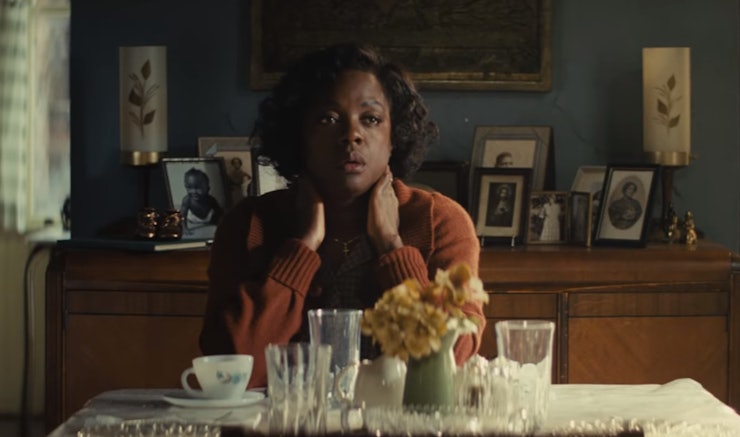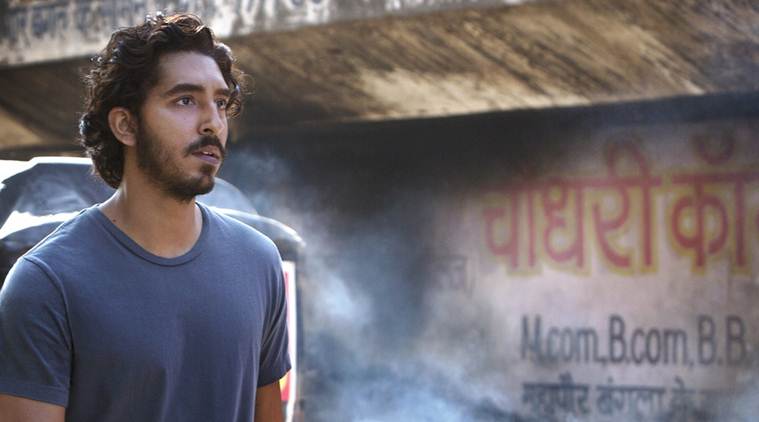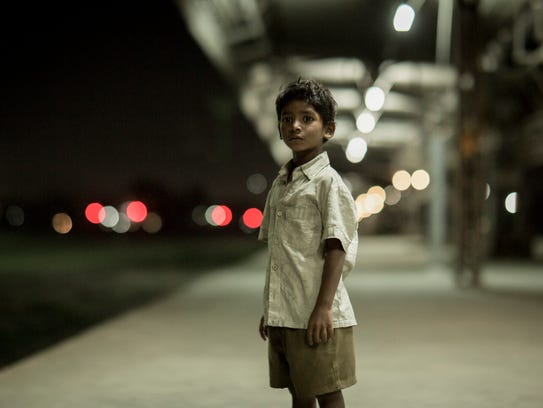And now, one last note from The General
2016 has been a brutal year for my schedule, hence all these roundup
posts that you have been seeing instead of more in-depth reviews as per
usual. The reasons for this are many and varied, but the base fact is
that, at this stage, I've been behind on my reviews for something like
ten months. It's time to finally put a close to all of that by catching
up once and for all. Here we go.
The General's Post Winter Roundup
Moana
Alternate Title: Insert Rock Pun Here
One sentence synopsis: The daughter of a Polynesian chief sets out to find the legendary
demigod Maui, and to stop the evil force that is sucking the life from
her island home.

The Verdict: Let's talk about Disney.
It's no secret that Disney's been on a
tear recently, what with animated movies like
Frozen,
Big Hero 6, and
Zootopia (to say nothing of the work of their subsidiaries: Pixar,
Lucas, and Marvel). It's consequently also no secret that I've started
looking forward to a new Disney film with more than average
anticipation, particularly given the general quality of films this year.
Add in The Rock, whom I'm always happy to see, and this one looked
like a film not to be missed.
Based around a polyglot version of
Polynesian mythology, Moana is the story of a Disney Princess, in this
case the titular Moana, daughter of an island chief who dreams (as most
Disney princesses do) of the the typical "more", in this case of
becoming a legendary "wayfinder", a navigator who seeks for new islands
across the breadth of the South Pacific. Propelled into leaving her
home-island in search of a remedy for a terrible curse that has settled
over it, she meets with demigod Maui, (a figure revered all across
Polynesia as a sort of semi-divine culture hero), who very reluctantly
joins her quest to destroy the evil forces that have brought scarcity
and dearth to her island. Along the way, there are ludicrous, over the
top villains, thrilling action scenes, gorgeous animation, a bunch of
rousing songs, and an animal sidekick thrown in for comic relief.
So
yeah, pretty much par for the course for a standard Disney film. But
Moana pulls most of this off well, particularly the visuals, which are
staggeringly gorgeous, with a rich, deep color palate and the latest and
greatest computer-animated effects for water, storms, and sand. Though
Disney's animation style is fully intact, with crisp visuals and
well-drawn characters, certain elements branch out into a (fittingly)
more Polynesian art style, particularly the animated tattoos that adorn
Maui's body describing his exploits. The voice acting, from The Rock,
from Flight of the Conchords' Jemaine Clement, and from newcomer Auli'i
Cravalho, is excellent across the board, with particular honors going to
Clement, who plays a gigantic jewel-obsessed crab in the best tradition
of Tim Curry in Fern Gully. Action, and there is plenty of it, is
high-speed and clearly shot, incorporating everything from
Eroll-Flynn-style swashbucking scenes to Hakka war dances performed by
warriors confronting evil volcano gods. All told, the movie has
everything you would expect to see from a concept like "Disney does the
South Pacific", including Alan Tudyk as the world's stupidest chicken,
and messages about following your dreams.

So is Moana a triumph
on the level of Frozen or The Lion King? Not really. For one thing,
the songs themselves, an important element in any kind of Disney film
are pretty undistinguished. We've got the grand sweeping "I Want
Moooooooore" style ballad, the fun "I'm a Whimsical Character who is
Kooky and Weird" pop number, all the standard stuff, and while all of
the songs are perfectly workable, there's nothing here to compete with
the great Disney animated songs of yesteryear, from Let it Go to Tale as
Old as Time to Be Prepared. And speaking of Be Prepared, the one major
song archetype the film lacks is a good Villain Song, that time-honored
Disney tradition that has given us their best work. Part of the reason
for that is that the villain in Moana is a complete cypher, a roaring
volcano-god of raw destruction with no personality beyond looking scary
and wanting to kill, and while there are plot reasons for this lack of
sophistication, it still hurts both the narrative and the
song-selection, as we get no opportunity for a great Villain piece along
the lines of Hellfire or Poor Unfortunate Souls. Granted, it's not
exactly fair to criticize Moana for not being just like another movie,
but Disney is a formula studio, and in everything but this, they adhere
quite closely to the standard Disney formula. It's good, don't get me
wrong, but lacks that key moment that would push the film over the top,
either through innovation, or through perfect execution. The pacing is
generally undistinguished, with too much downtime between moments of
excitement, and there's a certain lack of ambition involved in a film
that spends most of its time on a small boat in the middle of the ocean
making (admittedly pretty funny) references to Mad Max movies as opposed
to giving us a more cohesive world, the way some of the best Disney
films have.
Moana is a good film, well-executed and with a
trembling eye towards the masses of people who were waiting to accuse
Disney of cultural appropriation if they slipped up (some of whom did so
anyway, because they are stupid). But it is not a masterpiece in the
vein of Disney's last three or four attempts. Unoffensive and
entertaining enough, it's a fine movie to go see for a weekend trip to
the multiplex, but I do not expect to find people humming its songs to
themselves while walking down the street six months from now. Then
again, a good film is no slur to anyone's reputation, not even
modern-day Disney. And if this is the worst film Disney put out this
year (and it is), then that's a hell of an achievement by itself.
Final Score: 7/10
o-o-o-o-o
Allied
Alternate Title: Pittfalls
One sentence synopsis: A Canadian SOE operative and a French Resistance fighter fall in love
and marry, only for her to be accused of being a Nazi spy.
 \The Verdict:
\The Verdict: Brad Pitt is a gorgeous man, somehow more handsome at the age of 53 than
he was twenty-five years ago (I stand by this), but he's not a very
good actor and has never been one. Oh there's been plenty of movies in
which he elevated himself, 2014's
Fury for one, but overall he's usually
just a pretty face with a narrow range of emotions who is there to look
good and eat food on camera. More than one film has been salvaged by
casting Pitt opposite someone who COULD act, be it Tom Cruise in
Interview with the Vampire, David Thewlis and B.D. Wong in Seven Years
in Tibet, or everyone the Coen Brothers ever met in Burn After Reading.
This time, in Allied, a period war drama about resistance fighters,
spies, and double-crossings, the filmmakers thoughtfully gave us French
actress Marion Cotillard to play the part of the real actor in the
movie, a part she is indisputably qualified for. She plays Marianne, a
French Resistance fighter who has escaped to Casablanca and who meets up
with Pitt's Max Valan to assassinate a German General and escape back
to London. Cotillard was born to make movies like this, rich period
pieces in the style of Casablanca itself, showcasing the danger,
excitement, and glamorous locations of the more espionage-laden sides of
WWII. She's so good in the movie, that she almost excuses the fact
that Pitt is not, as his typical stone-faced approach re-asserts itself,
leading us as the audience to, almost impossibly, wonder what someone
would see in one of the most gorgeous men alive. Such is Cotillard's
performance that we almost buy the absurd twists that the plot deploys
against her, and she almost singlehandedly makes the film work.
Almost.

Allied,
frankly, is not a very good movie, and the reason it's not a very good
movie is because it sticks way too close to formula. Director Robert
Zemeckis is, of course, an excellent filmmaker, but his strengths have
always been movies that stretch the imagination a bit, whose stories are
weird and quirky and offbeat, such as in Back to the Future or Death
Becomes Her or last year's
The Walk. When he tries to make a formula
picture, especially one he hasn't written, the result looks an awful lot
like this, mediocre films like Cast Away or What Lies Beneath, movies
that are serviceable entries in their genres, but not destined to be
remembered as anything special. The movie boasts stellar
cinematography, but the war-scenes are almost pro-forma exercises in
obligatory violence which happen and are then over, the better to
advance a plot that, while decently original, is rendered entirely
uninteresting by Brad Pitt's inability to emote anything beyond
self-satisfaction and blank-faced stoicism. For all the criticism I've
heaped upon him in this review, Pitt
can
act when he wants to, I've seen it happen, but he chooses this film to
morph back into his cypher from Tree of Life, which is the death knell
to sweeping romantic dramas like this one. The pace is agonizingly
slow, even with massive time-jumps to bring us periodically through the
war, and the lack of anything interesting happening allowed my
historian's mind to wander through the absurd contrivances that the film
employs for its historical veracity, such as having British citizens
wandering outside during a Blitz raid, setting undercover spy missions
in cities months after they were historically liberated from the Nazis,
and employing an ending that left me baffled as to just what the plans
of all those concerned were. I know that people get tired of me
complaining about historical details in every movie set before 2010, but
with acting this wooden from one of our leads and a plot that lends
itself to soap-opera "twists", there was little else for me to do for
large chunks of its runtime.
I've certainly seen worse films than
Allied, even ones starring Brad Pitt, but for all the pretensions
Allied makes of being an Old-Hollywood-style epic romance, it lands with
an audible 'thud', doomed by a bad performance, overdirection, and a
lack of crispness to any elements of plot or story. Those with souls
more romantic than mine may well find a way to let Allied sweep them
away into a realm of danger and romance, but for me, the fundamental
lack of anything interesting going on dooms the film to the ranks of
those I shall likely not be remembering at all.
Final Score: 5/10
o-o-o-o-o
Fantastic Beasts and Where to Find Them
Alternate Title: Make Magical America Great Again
One sentence synopsis: A magical wildlife researcher whose specimens break loose in 1920s New
York becomes embroiled in a conspiracy involving murder and monsters in
the American Magical establishment.
The Verdict: I was always kind of ambivalent on the Harry Potter films, a series
based on books that I loved, but whose film adaptations... varied, shall
we say, in quality. There was nothing globally wrong with them or
their casts, but my interest waned after a while, and I skipped the last
couple altogether, split as they were into two films for mercenary
reasons. With the prospect of a reboot (sort of), however, one starring
actors I admire and un-anchored to any textual source, I actually
re-discovered a bit of excitement for the Potterverse, and found that I
was interested in seeing what they had to show me. And so, now having
seen Fantastic Beasts and processed it thoroughly, a single thought
occurs to me.
These movies are fucking dark.

There's
always been a strong anti-authoritarian streak to Harry Potter, no
doubt the product of its author, what with children (or other marginal
figures) being revealed as possessing simple wisdom, while almost all
authority figures are revealed as being shallow-minded, bureaucratic
incompetents at best, and outright genocidal bigots at worst, with the
former often being transformed into the latter once you get to know more
about them. Fantastic Beasts continues that trend to such a degree
that I would be tempted to complain about an Anti-American bias if it
weren't for the fact that the series has always been just as merciless
with everyone else. The Magical Government of the United States may
look glittering and inclusive, with Art Deco-styled magical buildings,
fedora-and-longcoat-wearing Aurors, and a black, female President whose
stylings look like those of a flapper crossed with Cleopatra, but
beneath the surface it is a gang of brutal, anti-miscegenation (forget
'mudblood' prejudice, American Wizards are forbidden under pain of death
to marry or have children with mundanes), blinkered
reactionaries, arrogant, contemptuous, and stupid, who primarily exist
to throw obstacles, lethal or otherwise, in the way of our plucky heroes
trying desperately to save the day. This is a film where anyone
competent is evil, and anyone incompetent is merely antagonistic, and
while that's fine, generally speaking, it does result in a rather
unavoidable tonal clash when the rest of the film is trying to be an
enchanted adventure of whimsy and wonder.
Another thought that
occurred to me as I watched this film was that it appears to be a good
year for autistic heroes, as first
The Accountant and now this film have
showcased leading characters that are... shall we say... neuroatypical?
Our lead here is Newt Scamander, previously a background character in
the wider Harry Potter universe, portrayed here by Eddie Redmayne as
either a high-functioning autist or simply the most awkward British
introvert alive (it can be difficult to distinguish the two). Honestly,
Redmayne is excellent in the role, a committed magical-zoologist with
little interest or time in anything else, who has no idea how to
interface with most people beyond a veneer of officious British charm,
and no particular interest in learning. I suspect most British actors
are born with the ability to exhibit charming befuddledness on command,
but Redmayne nevertheless goes above and beyond, delivering a
performance that's surprisingly nuanced and warm, despite the
requirements of the role, even when the Oscar-winning actor is called
upon to perform an elaborate mating dance for a creature that appears to
be a cross between a rhinocerous and a stag beetle. Behold, the
dignity of acting.

Would that the rest of the movie were as good
as Redmayne is, but sadly it is not. Comedian Dan Fogler and Alison
Sudol turn in serviceable roles, the former as a Nomaj (No-Magic, or
Muggle in Brit-speak) cannery worker who gets caught up in the magical
madness against his will, the latter as an airheaded Legilimens
(mind-reader) with a big heart. Newcomer Katherine Waterston, playing
leading lady Tina Goldstein, an ex-auror trying to solve the case, does
not. Her character is supposed to be a no-nonsense gumshoe battling for
what's right despite the orders from on-high, but she plays the
character like a wide-eyed innocent, constantly bursting in on important
meetings of the magical congress (called MACUSA for short) before forgetting what she was going to say. The
character never gels properly, which unfortunately makes her look rather
stupid, a quality I do not admire among my plucky protagonists. Colin
Farrel, meanwhile, takes the villainous role of Percival Graves, and
he's fine... at least by comparison to your typical Colin Farrel role.
His character, ultimately, is nothing more than a teaser for other
movies to come, though how this is accomplished is obviously something I
shall not be describing here. The rest of the plot, which involves
among other things a group of neo-Salemite witch-burners, child abuse, a
newspaper magnate played by Jon Voight, and his son, a normal, non-magical Senator, is confusing and belabored, with Deus Ex Machinas
liberally strewn throughout for whenever the writers get themselves in
trouble and have no idea how to resolve things. It's nothing horrific,
and it doesn't rob the film of
all of its charm, but it takes a big enough bite out to be noticeable.
Ultimately,
Fantastic Beasts and Where to Find Them is a decent enough film, one
that has enough imagination, whimsy, and hammer-handed political
allegory to satisfy any die-hard Harry Potter fan. But I doubt
seriously it's going to convert too many fence-riders to jump one way or
the other, especially not given some of the promises it makes regarding
the sequels to come... but then that would be telling ;)
Final Score: 6/10
o-o-o-o-o
Manchester by the Sea
Alternate Title: Broken People Living Marginal Lives
One sentence synopsis: A janitor moves home to the New England town he grew up in after his
brother dies, and finds he must take care of his now-teenage nephew.
The Verdict: Oh goody, another movie with universal critical acclaim! Surely this
won't turn out to be an epochal disaster like
Leviathan,
Under the Skin,
The Railway Man,
White God, or
Elysium!
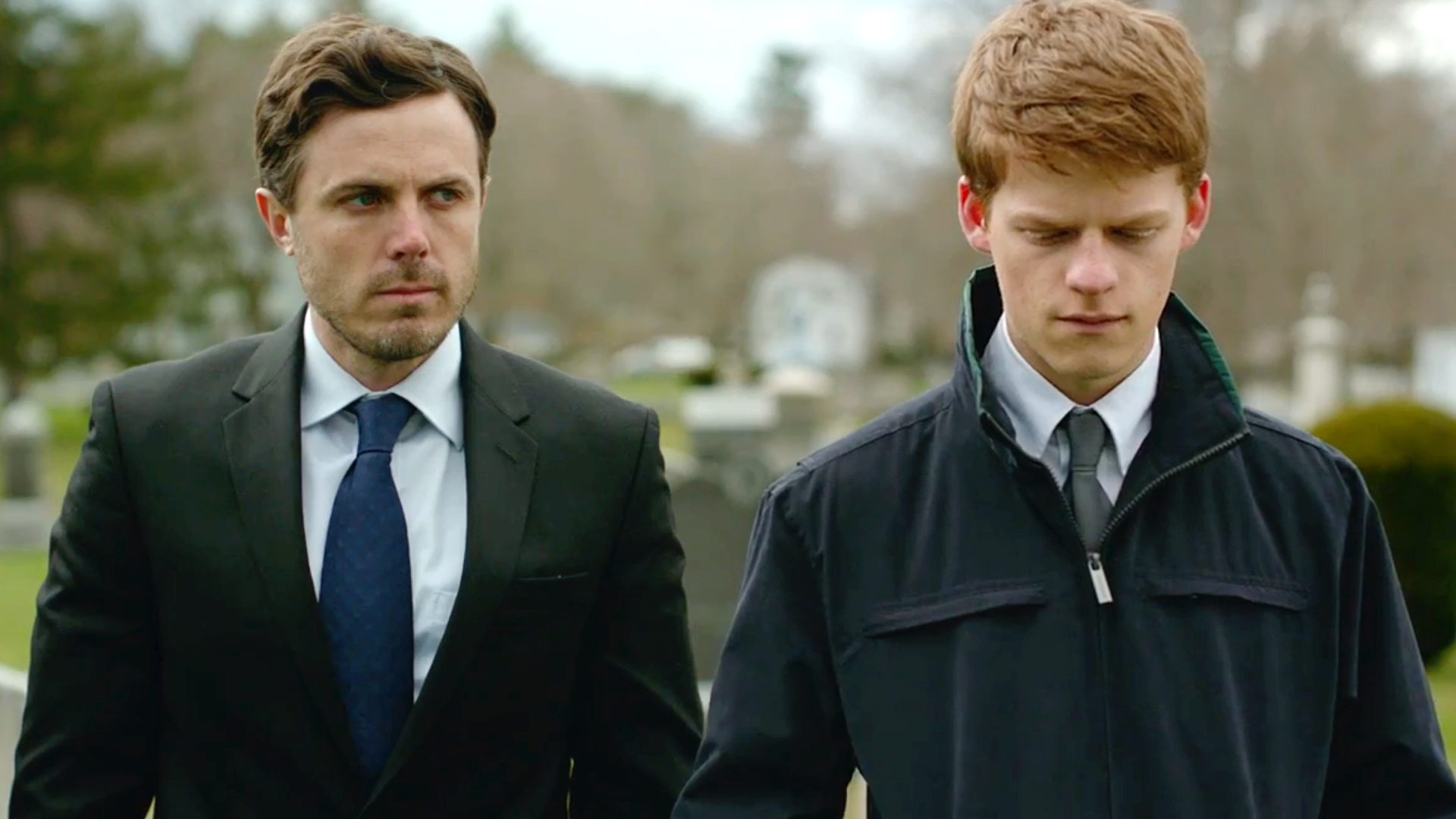
One of the (few) bright
spots at the movies this year was February's underrated crime flick
Triple 9, a movie that aspired to be a modern-day version of the classic
1995 Michael Mann thriller Heat, and came closer than I, for one,
thought it had any chance of. Triple 9 had a bunch of very good actors
in it, including Chiwetel Ejiofor, Kate Winslet, Anthony Mackie, Michael
K. Williams, and the reason we're here today, a fine actor whom I've
been following for several years now, Casey Affleck, younger brother of
Ben. Far from being a hanger-on riding the coattails of his more famous
brother, Casey has spent the last decade or two proving that, if
anything, he is the more talented of the two (at least when it comes to
acting), in a host of recent movies including Out of the Furnace, Gone
Baby Gone, and The Assassination of Jesse James by the Coward Robert
Ford. Affleck's signature has long been playing quiet men on the edge
of a psychotic break, and thus we come to his character here, a janitor.
Somewhere
in the less scenic parts of New England, Lee Chandler (Affleck) works
as a custodian for an apartment complex, living alone with his beer and
guilt following horrific events which destroyed his life, marriage, and
family. Summoned back to his old hometown of Manchester-by-the-Sea
(Title call!) by the death of his brother (King Kong and
Argo's Kyle
Chandler), he discovers that he's been named the custodian of his
sixteen-year-old nephew Patrick (Lucas Hedges), and must now uproot his
life to deal with the thousand-and-one things that must happen when a
loved one dies, arranging a funeral, reading the will, settling probate,
etc, while also somehow figuring out how to take care of a sixteen year
old whose father is dead and whose mother is a recovering drug addict
uninvolved in her son's life.
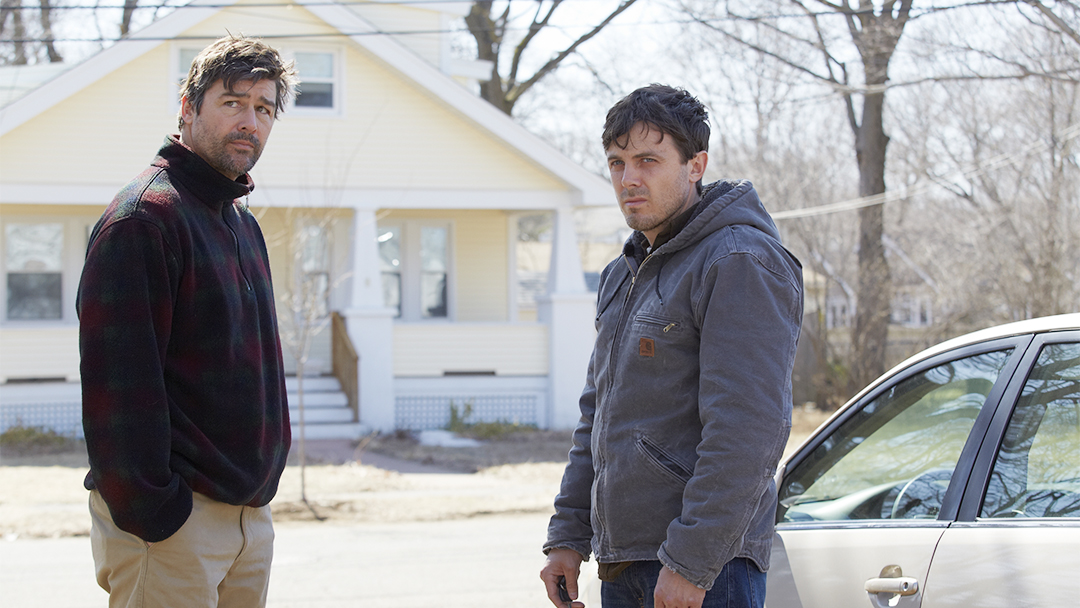
And that's... really all there is
to Manchester by the Sea, a quiet movie about damaged people living out
their lives that is almost militantly non-histrionic. Apart from the
occasional snap of bar-and-beer-induced violence, nothing really
"happens" in the film, no formulas, no character arcs, no dramatic
speeches or fights in crashing thunderstorms (I'm looking at you,
The Judge). Affleck plays the movie very close to the chest, walking
through the film as though in a daze, a man whose fires for life burned
out a long time ago and will not be rekindled by any Disney-esque magic
of last-second reconciliation or forgiveness. Hedges, meanwhile, plays a
very adult sort of teenager, who deals with his father's death by not
dealing with it, by and large, continuing his life with his friends,
multiple girlfriends, sports and school while only occasionally giving
into the emotions that the sudden loss of his father are generating.
The movie goes so far out of its way to avoid histrionics or any form of
formula that it quite perversely begins to feel incredibly depressing
and dour, as if the filmmakers thought
Biutiful was a good movie, but
needed more charmlessness and depression. It's a skilled production,
drawing emotional resonance from minimalist performances and eschewing
all of the conventional story beats we might expect with a film like
this, but
goddamn is it a
downer. Not that I have anything against non-saccharine movies, but the
relentless mundanity of these broken people's lives as they manage to
cobble themselves together and continue on with their empty existences
is not an experience I recommend for those looking to be taken away from
their problems for a couple of hours at the movies.
Manchester
by the Sea is one of those films whose quality is entirely divorced from
my enjoyment of it, a well made film that I have absolutely no need to
see again. Darling of the critical circuit as it has quickly become, it
may well generate the Palme d'Or's and Golden Globes and other such
awards it was obviously created to generate, but it has little to offer
anyone who isn't an admirer of the technical qualities of filmmaking.
And though I do indeed admire both it and Affleck for their evident
skills in piecing a defiantly non-traditional movie like this one
together at all, the film experience is simply not one I'm in any hurry
to repeat.
Final Score: 6.5/10
o-o-o-o-o
Rogue One: A Star Wars Story
Alternate Title: Sound and Fury
One sentence synopsis: The daughter of the designer of the Death Star joins a high-risk rebel
operation to locate him and stop the Empire from bringing the station
online.
The Verdict: *Sigh*
...
...
...
...
No, I'm sorry guys, I can't do it.

I
love Star Wars. Everyone loves Star Wars for god's sake, and I love it
right along side them. I love the originals, I love the games, the
RPGs, the new Disney series and the fun that is to be had therewith.
Forty years on and with countless imitators in its wake, and it's
still
the only science-fantasy franchise that's worth a damn, one that covers
every style and every genre of storytelling from noir to high fantasy
to space opera to classical tragedy across the board. I can even say
some good things about the Prequels if you force me to. So of course, I
went to see Rogue One, with high expectations. And of course in some
regards those expectations were met. But... no, I just can't geek out
over this one the way I really want to because the base fact is that the
movie isn't very good.
Look, I see why everyone loves it. I'm not stupid. It has wonderful
spectacle
to it, something Star Wars even at its nadir has usually done quite
well. The film takes place on half a dozen different wlldly-different
planets, each with its own lush and rich cinematographic possibilities
to offer, from a stony-desert world that looked chiselled out of
Monument Valley, to a rainy riot of buttresses and adamantine cliffs, to
a tropical paradise-world-turned military installation whose shot
inspirations seem drawn from WWII's Pacific Front (and which was
apparently filmed in the Maldive Islands). Certain shots come straight
out of an epic war or fantasy movie, such as that of AT-AT walkers
laboriously advancing through the dust and smoke of a battlefield,
toppling palm trees as they crash through their cover. In a world where
everything is shot either in the stark Bruckheimer/Bay contrasts of
Blue-and-Orange, or in washed out, dust-impregnated brown, this film
gives us vibrant colors and gorgeous setpieces to go with the lived-in
feel that Star Wars has always excelled in. Battles, and there are
several, are spectacular affairs, combined-arms showcases of space and
air and land all rolled into one, to say nothing of a truly epic
rendition of just what happens when a Death Star is used... sparingly.
Die-hard aficionados of the originals will find piles of easter eggs,
references, in-jokes, and subtle (and less subtle) callbacks to the
original series, enough to keep the internet spinning for years, and all
of this wrapped up in a story that is much more adult in feel than the
movies of yesteryear, filled with rebels who not only shoot first but
actively feel like the terrorists that they must be, in actuality, all
without sacrificing the essential good-vs-evil dynamic that the Star
Wars films are cored around.
So what's missing?
character.

Rogue
One is a movie with an enormous, almost labyrinthine plot, involving
multiple rebel groups and cells, political maneuvering on several
levels, reunions, betrayals, battle plans and lengthy engagements, and
to its credit it handles all of those things quite well, even when it
has to spend the first ten minutes of the film establishing about half a
dozen different planets that we will eventually be visiting. The
problem isn't the plot, it's that it has to do all of those things while
also establishing nine different major characters, none of whom we know
anything about going in (save for those who have been watching the
cartoon series), all in a runtime of less than two-and-a-quarter hours.
It's not that the movie fails in its attempts to characterize these
people, it's that characterizing that many people and that much plot in
that short a run-time
is impossible.
As such, we get the briefest introduction to each character before
plunging them into another battle or plot point, with the predictable
effect that almost all of them are complete cyphers, robbing the film of
the emotional core that the best Star Wars movies have. As always, a
lack of characterization throws the job of generating interest onto the
actors themselves, who accomplish their impossible task to varying
degrees of effectiveness.
Veteran character actor Ben Mendelsohn, of
whom I have always been a great fan, pulls it off, playing Death Star
project director Orson Krennic as a driven man who's life's work is
finally approaching fruition and who is stymied on all sides by
incompetence, political underhandedness, and the rebels (in that order),
who does not understand why things can never go smoothly, and why the
disasters that befall his pet project must continuously happen to him.
Nightcrawler-alum Riz Ahmed pulls it off as well, playing a defecting
Imperial pilot caught up in the larger chaos of the war between Empire
and Rebellion, a man trying to do the right thing unable to understand
what is happening around him. Mads Mikkelsen, Diego Luna, and Chinese
director Jiang Wen all also manage to pull at least something out of
their characters, respectively a broken man struggling to redeem a
lifetime of failure and deception, a committed rebel terrorist
attempting to ensure that the horrors he has perpetrated have meaning,
and a stoic badass with a gigantic machinegun (this is Star Wars), as
does Alan Tudyk, as the voice of the comic-relief droid, a world-weary
cynic who does what he must. But unfortunately, one who does not pull
it off is Felicity Jones, star of the movie, whose character of Jyn Erso
has no character whatsoever, a plot device at best who goes along with
the flow of the movie until it's time for the script-demanded "big
rousing speech" that the movie has entirely failed to earn. Forest
Whitaker, meanwhile, tries to escape into weirdness, playing a gasping,
throaty lunatic of a rebel fighter. One is reminded, with this
character, of Episode III's General Grevious, a villain that popped up
out of nowhere to command a central role that had not been established,
due to the character having been first created in one of the TV shows.
Leaving aside the question of this sort of practice, the character is a
complete non-entity, who plays no role but exposition before being
summarily dumped in favor of more plot.
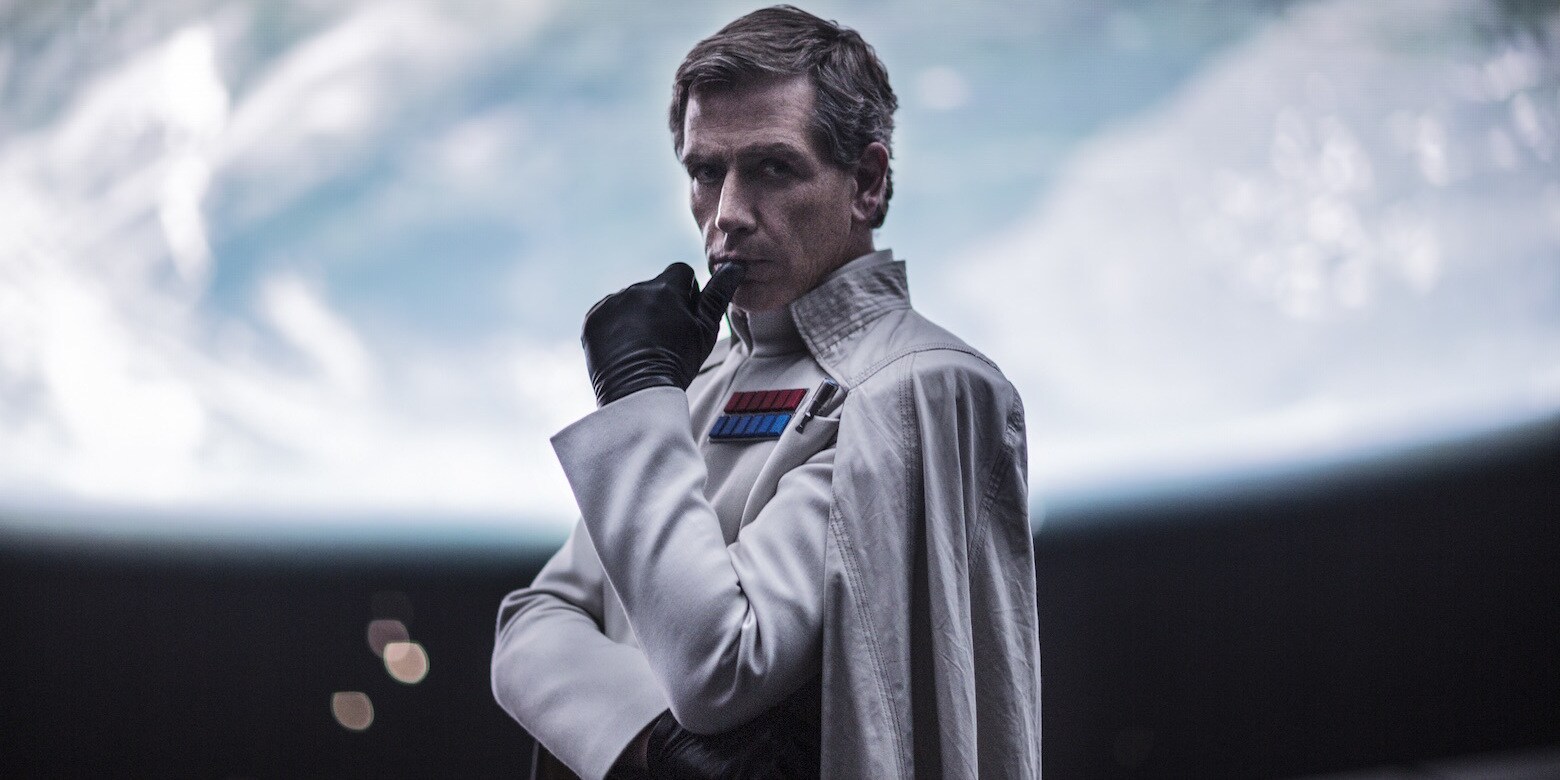
Rogue One is not a
terrible movie, nor a bad one, but in defiance of all those saying
otherwise, it is my solemn duty to report that it is a fairly mediocre
one, certainly not a disaster on the scale of the Prequels, but nowhere
near the equal of the originals, nor of last year's
Episode VII. It is,
to me at least, proof positive that Star Wars' strengths, particularly
in the modern day, do not rely solely on Empty Spectacle, as some
overly-serious critics might imply. Here, after all, is a movie that is
largely nothing except Empty Spectacle, and it does not equal the
warmth and glory of the predecessors, not even with a bevy of
decent-to-good actors at its service.
But then, surely the Prequels already told us that much.
Final Score: 5.5/10
o-o-o-o-o
La La Land
Alternate Title: Streetlight People
One sentence synopsis: An aspiring actress and a frustrated jazz piano player find love and follow their dreams in Los Angeles.
The Verdict: I feel like I've done you guys a disservice this year. I'm not talking
about the irregular schedule I've had, for that was unavoidable given my
other commitments. I'm talking instead about my selection of movies
for 2016. All year I've been beating the drum of the fact that 2016's
movies have been godawful, on average and in summation, and it's true
that if you look over the reviews I've laid down this year, that's
certainly reflected in the score. However, it wasn't until a number of
other critics started releasing their year-end best lists (mine are
coming, don't worry), that I began to realize that what was wrong with
this year might not have been the movies, but my taste in them. Most of
the films people were citing as the best of the year, movies like The
Handmaiden, The Nice Guys, or Neon Demons, were movies that I had, for
one reason or another, decided to skip in favor of more mainstream fare,
which turned out, generally speaking, to be utter crap. I pick the
movies I'm going to see based on purely arbitrary readings of trailers
and my own mood, but it's true that after the disaster that was 2015's
Indie cinema (Leviathan, anyone?), I turned back to Hollywood's
mainstream offerings, in the hope that I would not be subjected to a
movie as bad as any of those I saw in 2015.

Well that didn't
quite work the way I had anticipated, as the rest of my reviews from
this year can tell you. But as a final parting gift from 2016, I
decided to do something about this unpleasant trend from the year now
fondly departed. And so, bypassing more mainstream movies like
Passengers and Collateral Beauty (the vibes of which were becoming quite
toxic), I decided to go see a classic-style musical starring a sexy,
sexy man.
Which sexy man? Why, Ryan Gosling, of course, who
stars in La La Land as a jazz pianist struggling to follow his dream of
opening a classic jazz nightclub somewhere in Los Angeles, while dating
the equally adorable Emma Stone, who is that most common of all Los
Angelenos, an aspiring actress. I could tell you more about their
particular characters, but honestly, they're not really playing
characters as much as they're playing the ur-representations of Ryan
Gosling and Emma Stone, two movie stars caught up in a glorious musical
ode to love and life and dreams and the quest for all three, and god
damn
are they good at it. Granted, Gosling is not much of a singer, but in
all other respects the two of them are just radiant, playing modern day
incarnations of the featherweight characters that used to be portrayed
by people like Gene Kelly and Judy Garland and Fred Astaire. Stone even
tries her hand at tap dancing. And given that this is Ryan Gosling,
who as I mentioned before is a sexy, sexy man, and Emma Stone, one of
the most effortlessly charming actresses working today (and who is also
possessed of some of the most gorgeous eyes I've ever seen), the result
is a wonderful little movie, thin on plot (though perhaps not quite thin
enough) and long on song and dance and heartwarming, occasionally
bittersweet, modern fantasy. The musical numbers range from old-style
dance escapades that would not be out of place in a Ginger Rogers movie,
to more modern ensemble pieces, including a wonderful opening sequence
set, of all places, in the middle of rush hour traffic on a highway. It
rambles from big band ensembles to jazz numbers to
marching-band-and-samba pieces with cameos by John Legend and J.K.
Simmons. It's a wonderful movie, in the sense of being full of
wonderous things. I enjoyed it more than I have most anything else this
year.
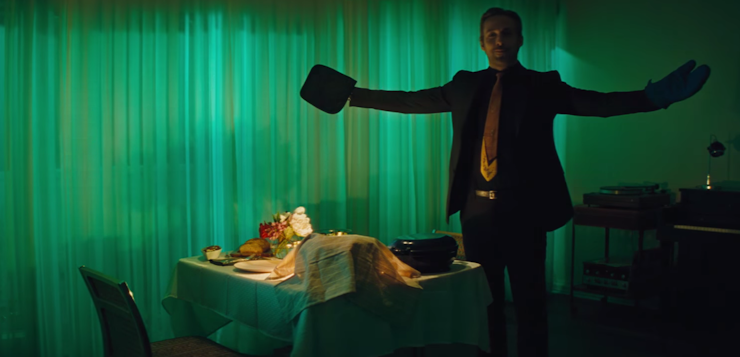
La La Land isn't perfect of course, the middle section
drags fairly heavily, due to the baffling decision to drop the music for
a while and focus on a fairly formulaic plot, but it scarcely matters
when dealing with a movie like this. La La Land is a charming movie in
every sense, one that is the perfect way to see out the calendar year of
2016, and usher in a year full of, hopefully, better things.
Final Score: 7.5/10
Next Time: We begin the January cleanup of last year's Oscar season with a stage-to-screen adaptation starring two of my favorite actors.






